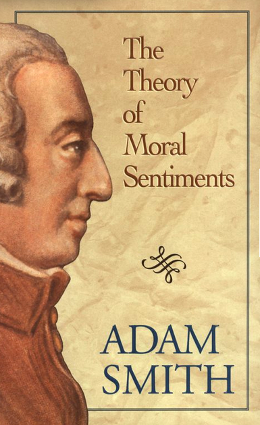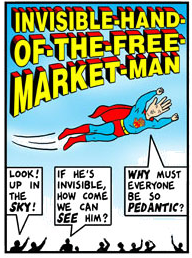If you’ve heard of Adam Smith, it’s probably because of his book The Wealth of Nations, which launched the study of economics, or his concept of “the invisible hand” by which individuals, each looking out only for their own personal gain, end up unwittingly contributing to the prosperity of society as a whole.
I have not read The Wealth of Nations, but I’m currently reading Smith’s earlier book, The Theory of Moral Sentiments. Today I’ll share some of my thoughts on volume one of that book, including the surprising context of his “invisible hand” quote.
When people argue about the application of moral values, usually implicit in their arguments is the theory that morality either arises from a system or that it ought to be systematized. In these arguments, showing that some ethical assertion or other is unsystematic or is systematically inconsistent seems equivalent to showing it to be disproven or wrong.
Therefore much ethical philosophy has involved systematizing morality in various ways and then trying to test the soundness of the resulting systems.
“Experimental” ethical philosophy takes a different tack: taking human moral judgment as a pre-systematization given and trying to describe its contours rather than force it into a rationally-invented mold.
The Theory of Moral Sentiments is in this camp, though Smith’s “experimentation” isn’t very rigorous — mostly amounting to introspection and examination of the opinions of well-considered men of his time, place, and class.
Anyone writing a book of experimental ethics today would spend a little time writing a prelude like this one that explains the difference in outlook and goals that motivates such a project and distinguishes it from most other ethical philosophy. Smith, though — curiously — just jumps in and starts describing human moral judgment without any such throat-clearing.
It is not until part two of the book, in a footnote that looks as though it were added to respond to critics who misunderstood this very nature of his project, that he makes things explicit:
…[T]he present inquiry is not concerning a matter of right, if I may say so, but concerning a matter of fact. We are not at present examining upon what principles a perfect being would approve of the punishment of bad actions; but upon what principles so weak and imperfect a creature as man actually and in fact approves of it.…
To Smith, the instinct to make moral judgments, like the instincts that make us hungry or horny, is built-in. And like those, the acts it prompts us to do tell us something about human nature and about how our creator (or Creator) intends to guide us.
We feel hunger to prompt us to sustain our bodies; we feel lust to prompt us to reproduce. Our feelings of resentment, gratitude, and other such moral emotions, Smith feels, must also have been implanted in us for the purpose of guiding our behavior toward certain ends. Rather than assuming the ends ahead of time and then trying to systematize an ethics that conforms to them, wouldn’t it be wiser (Smith feels) to carefully examine these emotions and try to derive these ends from what we find?
In every part of the universe we observe means adjusted with the nicest artifice to the ends which they are intended to produce; and in the mechanism of a plant, or animal body, admire how every thing is contrived for advancing the two great purposes of nature, the support of the individual, and the propagation of the species. But in these, and in all such objects, we still distinguish the efficient from the final cause of their several motions and organizations. The digestion of the food, the circulation of the blood, and the secretion of the several juices which are drawn from it, are operations all of them necessary for the great purposes of animal life. Yet we never endeavour to account for them from those purposes as from their efficient causes, nor imagine that the blood circulates, or that the food digests of its own accord, and with a view or intention to the purposes of circulation or digestion. … But though, in accounting for the operations of bodies, we never fail to distinguish in this manner the efficient from the final cause, in accounting for those of the mind we are very apt to confound these two different things with one another. When by natural principles we are led to advance those ends, which a refined and enlightened reason would recommend to us, we are very apt to impute to that reason, as to their efficient cause, the sentiments and actions by which we advance those ends, and to imagine that to be the wisdom of man, which in reality is the wisdom of God.
Our moral emotions serve us. They sustain us and help us to propagate by prompting us to actions that strengthen useful friendships and discourage human enemies, predators & parasites. For example, our acts and declarations of gratitude, prompted by our moral emotions, further encourage those who have shown themselves to be able & inclined to do us useful service.
Smith, — remarkably, in — had written a book of evolutionary psychology. He didn’t know that was what he was doing, of course (Darwin’s On the Origin of Species was still ), but his book is agnostic enough about the nature of this creator who “implanted the seeds of [moral emotion] in the human breast” — sometimes it is “Nature,” other times “the author of nature,” other times “God” or “the Deity” — that it is not particularly awkward to fill in the blank today, now that we know the answer. Smith at times comes awfully close to this himself, as for instance when he describes the different emotional bonds that connect parents and children:
Nature, for the wisest purposes, has rendered in most men, perhaps in all men, parental tenderness a much stronger affection than filial piety. The continuance and propagation of the species depend altogether upon the former, and not upon the latter.
The edition I got from the library was published by Regnery Publishing for the “Conservative Leadership Series” of the “Conservative Book Club.” It’s not a very good advertisement for that brand, being riddled with typographical errors, misspellings (applause ringing in our “cars,” for instance), missing words, and other awkwardnesses that demonstrate that optical character recognition software is no substitute for a dutiful editor. I suspect that a book club selection like this is meant more for ostentatious display than for reading, however, so perhaps such niceties are superfluous.
In some ways, Adam Smith is a sensible choice for the conservative pantheon. His free-trade / free-market viewpoints, once considered de rigueur for good liberals, are now mostly honored (and mostly in the breach) by American conservatives. But this book doesn’t seem to harmonize well with contemporary American conservativism: Moral descriptivism is far too godless. I expect most Conservative Book Club members would be horrified if their children were being taught by some liberal professor about how morality was implanted in us by nature to promote the survival of the individual and the propagation of the species, and that you could derive morality from human ethical emotions without any reference to preexisting moral absolutes.
But back to Smith: When I first read Smith’s description of conscience, I was lulled by how sensible it seemed and at first I didn’t notice what an unusual explanation (for its time, anyway) it was. To Smith, “conscience” isn’t the insight by which we discern good & evil or the nagging voice prompting us to resist temptation, but is instead the faculty by which we simulate the perspective of an impartial observer who observes our own headspace and behavior, using the same criteria we naturally use when judging others. It is an application of the same, innate judgments we already have access to by virtue of being human, but using a difficult and specialized variety of imagination in which we cast that judgment through a point of view that is not our own and not (as) prejudiced by self-interest.
Because this process is so difficult, especially when our minds are distracted by particularly strong temptations or crisis circumstances of quick change and the need for rapid action, we tend to supplement our consciences by inventing and memorizing heuristics that we can apply to situations so that we can quickly flag those that require conscientious scrutiny. This process of inventing heuristics, Smith believes, is the source of the ethical philosopher’s suspicion that ethics is or ought to be systematized:
It is thus that the general rules of morality are formed. They are ultimately founded upon experience of what, in particular instances, our moral faculties, our natural sense of merit and propriety, approve, or disapprove of. We do not originally approve or condemn particular actions because, upon examination, they appear to be agreeable or inconsistent with a certain general rule. The general rule, on the contrary, is formed by finding from experience that all actions of a certain kind, or circumstanced in a certain manner, are approved or disapproved of.
When these general rules, indeed, have been formed, when they are universally acknowledged and established by the concurring sentiments of mankind, we frequently appeal to them as to the standards of judgment, in debating concerning the degree of praise or blame that is due to certain actions of a complicated and dubious nature. They are upon these occasions commonly cited as the ultimate foundations of what is just and unjust in human conduct; and this circumstance seems to have misled several very eminent authors to draw up their systems in such a manner as if they had supposed that the original judgments of mankind with regard to right and wrong were formed like the decisions of a court of judicatory, by considering first the general rule, and then, secondly, whether the particular action under consideration fell properly within its comprehension.
The book has some flaws. For one thing, Smith is wordy and repetitive. He seems to think if a point is worth making, it’s worth making three times just to make sure. I’ve never read a book that cried out more for a Readers’ Digest abridged edition. But aside from points of style, the major flaw is Smith’s insistence that an examination of human morality is equivalent to an examination of the opinions of well-bred, enlightenment-minded, well-to-do English men of the 18th century. His curiosity isn’t sufficient to consider other points of view as also being manifestations of human nature, or as anything but inferior versions of the mature morality of his fellows. Some of his conclusions follow comfortably and obviously from his biased choice of exemplars, and are unconvincing to the modern, more cosmopolitan reader.
But it’s ahead of its time and thought-provoking, and a well-needed perspective on ethical philosophy that ought to be more influential today than it appears to be.


